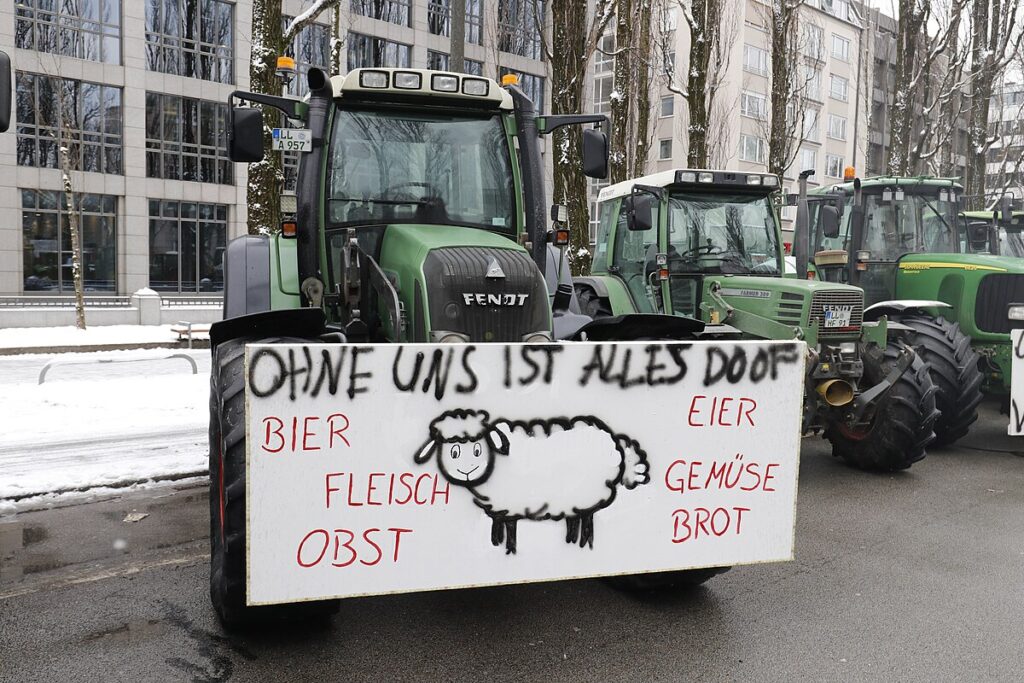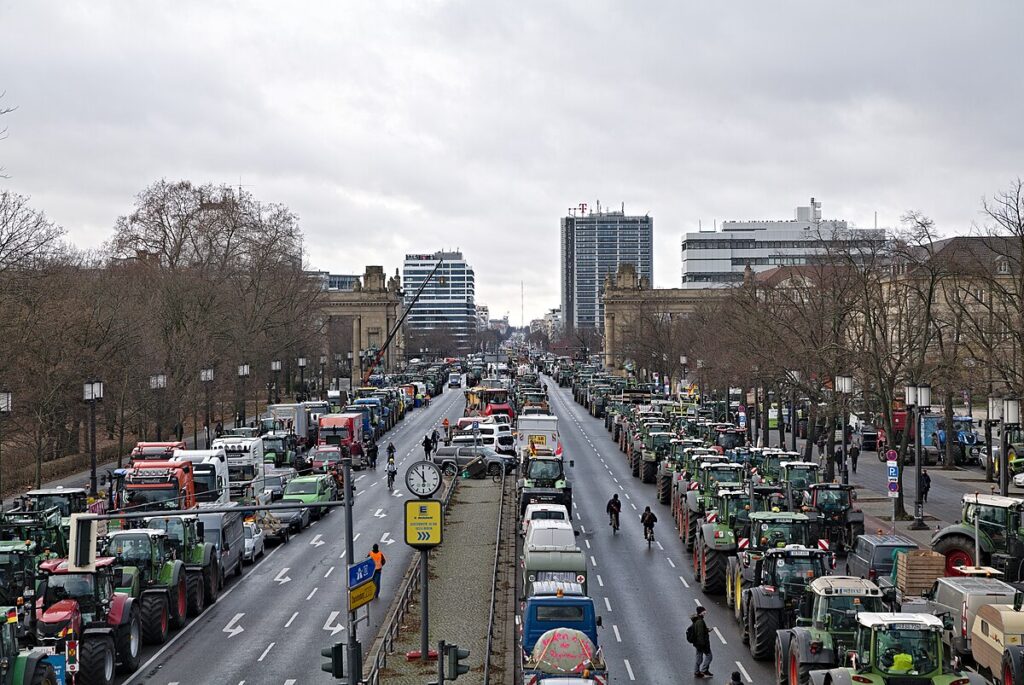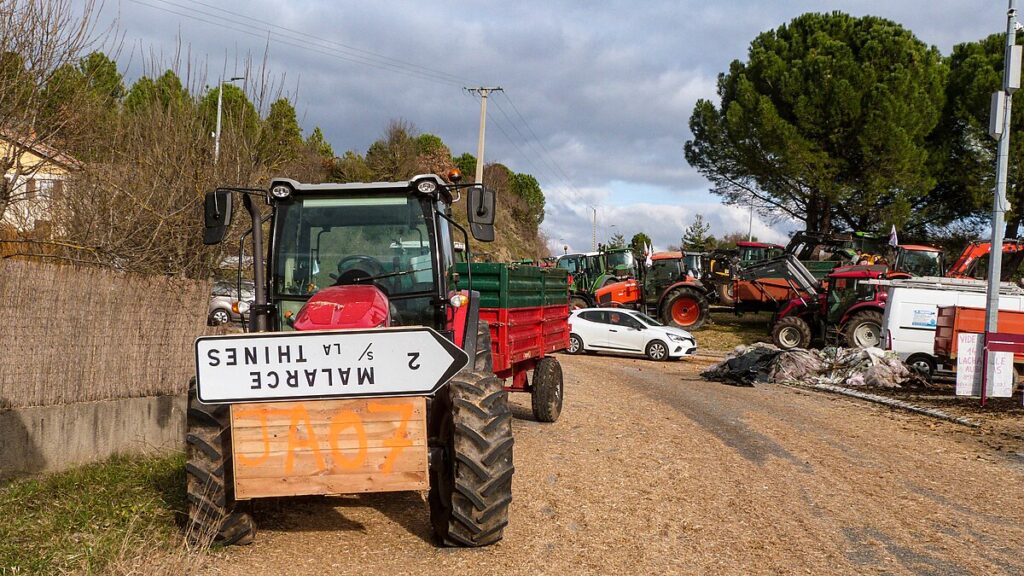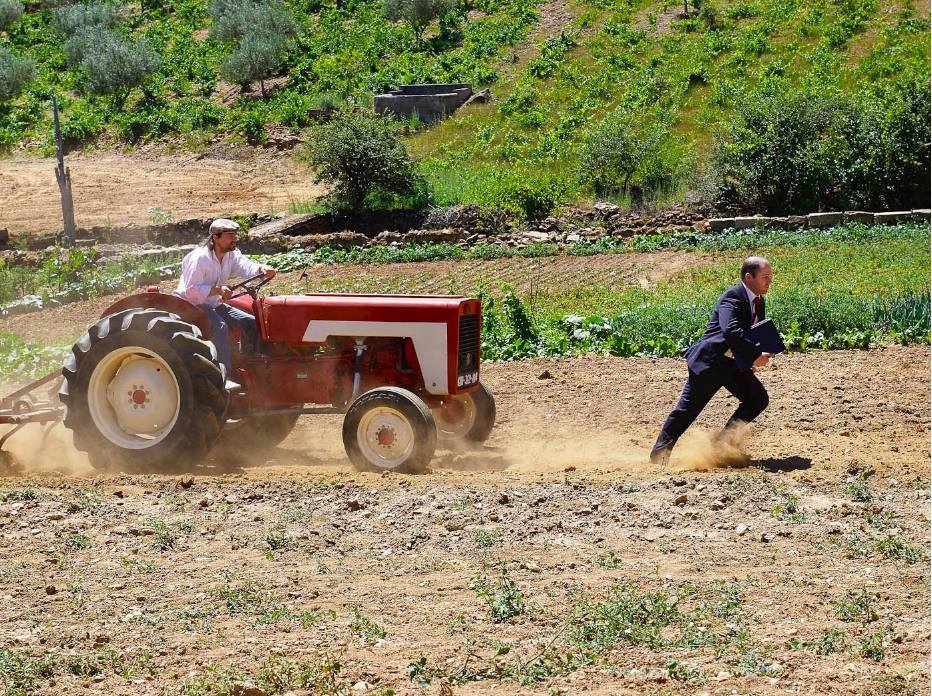By Natalia Mamonova
The recent farmer protests that swept through European capitals and ended up at Luxembourg Square in Brussels were largely linked to national and EU policies of the green transition and environmental protection. Why do European farmers rebel against the green policies that meant good for the planet? And what is wrong with the European agricultural system that creates unresolvable tensions between farmers’ livelihoods and the need to protect the environment?
Although farmers’ dissatisfaction with green policies was not the only reason for taking to the streets (other complaints included falling incomes amid rising costs, unfair competition from imports, bureaucracy and lack of future prospects), the European farmers “anti-environmentalism” made headlines in major newspapers. Indeed, French and German farmers protested the phasing out of tax breaks on agricultural diesel. Spanish farmers rebelled against the government plans to curb water supply for irrigation. Irish farmers condemned national restrictions on beef farming that were part of the government’s Climate Action Plan. At EU level, farmers demanded the repeal of the Sustainable Use Regulation, which aims to halve the use of pesticides on EU farms, and loosening of green farming requirements under the Common Agricultural Policy.

Farmer protests in Munich, Odeonsplatz, Ludwigstrasse, Leopoldstrasse. 2024-01-08. Source: Wiki Commons
The scale of the farmers’ protests came as a surprise to some politicians. In an attempt to calm angry farmers and secure their position in the upcoming elections, national and EU government leaders have taken “stabilizing actions” and suspended or rolled back some unpopular policies. This regressive turn in Europe’s green transformation has been called “shameful” and “hypocritical” by environmental movements as it threatens the European Green Deal, which aims to make food systems fair, healthy and environmentally friendly. However, by rolling back part of the green regulations, politicians are not seeing the forest for the trees. It’s not the greening efforts that make farmers angry: rather, it is the economic and agricultural model that is failing farmers as well as other vulnerable categories and the nature overall.
The last five decades have been characterized by the spread of neoliberalism in all spheres of life, including agriculture. Based on free market capitalism and laissez-faire policies, neoliberalism offered a market-based solution to socio-economic problems. The modernization paradigm – that underpins the European agricultural and rural development policies – suggested that industrialization and commercialization of agriculture would not only increase food security, but would also constitute a powerful engine of economic development. This did make European agriculture more cost-efficient and technologically oriented, but it also created many other problems, including environmental ones.
Following the premise of “bigger is better”, the EU Common Agricultural Policy aimed to “modernize” farmers by turning them into market-oriented capitalist entrepreneurs focused on constant growth and expansion. Nature became just one of the resources in this capitalist accumulation and is often sacrificed to economic growth. While farmers are not anti-nature, on the contrary, farmers’ livelihoods are directly dependent on ecosystems, they had no choice but to submit to the rules of neoliberal agricultural development and become larger and more industrialized. Those who did not follow the “modernization” paradigm faced bankruptcy. In the last decade alone, the number of full-time farmers in the EU has fallen by one third, representing 5 million jobs.

Demonstration of farmers on the Straße des 17 June in Berlin-Charlottenburg. Source: Wiki Commons
Under constant pressure to increase yields and improve competitiveness, farmers became trapped in the so-called “chemical dependency treadmill” following ever-increasing recommendations from agrochemical corporations to use pesticides and chemical fertilizers. Likewise, the use of fossil energy in European agriculture has increased significantly since the beginning of the modernization project. According to estimations by Dutch rural sociologist Jan Douwe van der Ploeg, producing food with an energy content of 100 gigajoules (GJ) in 1950 required 81 GJ of fossil fuel. By 2015 the amount of fossil energy to produce the same amount of food had almost tripled to 225 GJ. Unsurprisingly, today industrial agriculture is one of the major environmental polluters, accounting for 10% of EU greenhouse gas emissions.
However, instead of rethinking the entire system, European leaders try to fix the environmental problems the same mindset that created them: most of the green projects that aim to achieve sustainable development and zero-sum emissions follow the growth logic, or “green neoliberalism” – they aim to expand and invigorate markets through the sustainability movement, are based solely on economic calculations, and place the heaviest burden on farmers. The current rollback of some green policies will not help farmers in the long run, it will only increase the profits of multinational corporations and chemical giants. Thus, the EU’s repeal of the Sustainable Use Regulation increased the share price of Bayer – the EU’s largest pesticide producer – by more than 5% on the day of the announcement.
To help farmers and make European agriculture more environmentally friendly, a completely new development paradigm is required that could free the farmer from the vicious circle of scale enlargement and technologically driven intensification. Food sovereignty can offer a sustainable solution to the existing crisis of neoliberal agriculture, as it puts wellbeing ahead of profit. It is based on recognizing the right of peoples to healthy and culturally appropriate food produced through ecologically sound and sustainable methods, and their right to define their own food and agriculture systems. It puts those who produce, distribute and consume food at the heart of food systems and policies rather than the demands of markets and corporations. While a popular ideology among progressive peasant movements in the Global South, food sovereignty is not as widespread in Europe, where farmer movements remain quite conservative and there is a lack of transnational genuine dialogue and cooperation among them.

The Moulines roundabout in Saint-Etienne-de-Fontbellon partially blocked by farmers during the January 2024 protests. Source: Wiki Commons
The current farmer protests are perhaps the first serious attempt by European farmers to overcome their differences and present a united front in their struggle for a better future. Pan-European farmer organizations such as COPA-COGECA, representing conventional farmers, and the European Coordination of the international peasants’ movement La Via Campesina, stood side by side during the protests, demanding European leaders to implement meaningful changes. While there are still too many differences between industrial farmers and peasant-like organic food producers in Europe to support a united movement in the long term, the farmer protests have highlighted the urgent need for a fundamental transformation of our agri-food system.
Profile picture: Farmers protest meme. Source: Facebook.






One Comment